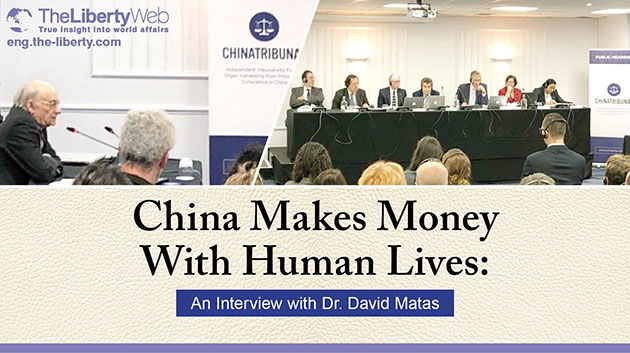China Makes Money With Human Lives:
An Interview with Dr. David Matas
Dr. David Matas
International Human Rights Lawyer, Barrister& Solicitor
Born in Canada, he served as a member of the Canadian delegation to the United National General Assembly, Director of the International Centre for Human Rights & Democratic Development, and member of the CBA Committee on the Constitution. He was nominated for the 2010 Nobel Peace Prize and for was awarded the 2017 Gandhi Peace Prize.
(Interviewer: Hanako Cho)
The number of transplant operations performed in China is 3 times that of the U.S. But it is not only the numbers that are truly astonishing: it is the speed. In the U.S. waiting lists extend from several months to years, whereas in China a few days to weeks of waiting will suffice.
The question is, “where do they get so many organs so quickly?”
The answer is that that China is extracting organs from prisoners of conscience – such as Falun Gong members – whom they can murder anytime they require a human organ. A decade-long study uncovered that China is extracting organs from innocent Falun Gong and Uighur people “on-demand”. This appalling process is known as “organ harvesting”.
A Renowned Specialist Visits Japan
Dr. David Matas is a human rights lawyer who has been investigating this problem for many years. Below is an excerpt of his interview with The Liberty Magazine taken last month when he visited Japan to give lectures.
Interviewer: Please tell us about the current situation with organ harvesting.
Matas: In China, there is a boom in building hospitals that can cater to transplant operation. It’s because hospitals can make huge profits from transplants. Transplants are available in hospitals run by the People’s Liberation Army, and they’re spending the profits on the military.
The number of operation is rising because transplant patients come to China from all over the world. On the other hand, the number of people providing the organs – the Falun Gong members – are decreasing. The increased the number of arbitrary arrests of Uighurs provides a replacement supply.
China obtained the technology to lengthen the ischemic time, so they were able to create a system to deliver organs from Xinjiang Uyghur across the whole of China.
I conclude that at least 25,000 to 35,000 prisoner of conscience are killed every year.
Interviewer: You testified at the people’s tribunal in Britain last December.
Matas: Yes, because China’s organ harvesting is a state crime. But since China has veto power in the UN, the UN cannot bring them to trial. At the people’s tribunal, the judges were all distinguished people and their verdicts have weight. It will be a big step in shaping public opinion.
Interviewer: In Japan the Ministry of Health, Labour and Welfare setup an insurance scheme to cover transplant tourism in December 2017.
Matas: Japan shouldn’t pay health insurance to transplant tourists. In countries like Israel and Taiwan, people who embark on transplant tourism are fined or imprisoned by law. Japan is going against this law.
Interviewer: How can we stop organ harvesting?
Matas: We cannot stop what is already happening inside China, but we can stop Japan from becoming an accomplice by prohibiting transplant tourism.
If someone in Japan is involved in transplant tourism, it should be compulsory for medical practitioners to immediately inform the Ministry of Health, Labour and Welfare. That way we can get a grasp of how many transplants are being conducted. Because if you don’t know what is happening, you can’t know how to fix it: a vicious circle.
It’s also necessary to stop collaborative research projects between hospitals in Japan and hospitals in China that do transplants. It would also be effective for Japan to sign the Council of Europe Convention against Trafficking in Human Organs.
The U.S. Congress and Czech Republic parliament have passed resolutions against transplant tourism into China, and Japan must also do the same. Japan should also enact a law to freeze the assets belonging to China’s transplant abusers, like the Magnitsky Act.
What We Can Do
“We need to request the Diet to investigate how much transplant tourism is going on,” says Hideaki Kase, Chairman of the SGM Network in Japan, who attended Matas’ lecture. “After that we want to adopt measures to prohibit transplant tourism.” Japan should also boycott the Beijing Winter Olympics in 2022, he added.
Organ harvesting is the quintessential symbol of a materialist country that views her own people as mere “things”. Japan must not remain silent and watch as China infringes the rights of our fellow humans. And they must not assist in those crimes through providing insurance schemes for transplant tourism. Japan urgently needs to legislate a prohibition on transplant tourism and demand China to release those prisoners of conscience who are facing the fear of death every hour.



















